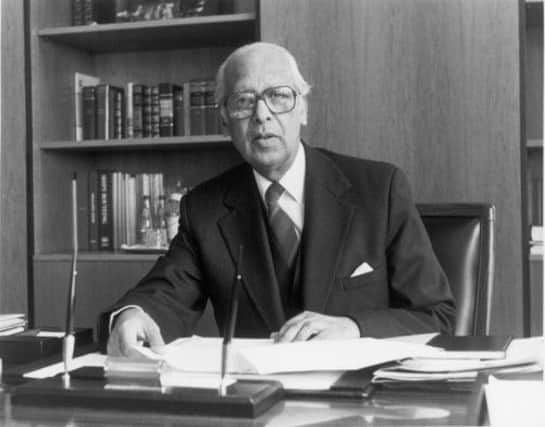Obituary: Chandrika Prasad Srivastava KCMG, diplomat


Chandrika Prasad Srivastava was the longest-serving secretary-general of the London-based International Maritime Organisation (IMO), the United Nations agency responsible for the safety of shipping around the world and for the prevention of marine pollution by ocean-going vessels.
So influential was his tenure that he was named IMO secretary-general emeritus after his retirement in 1989 and awarded an honorary knighthood by the Queen the following year for his “service and contribution to world shipping”.
Advertisement
Hide AdAdvertisement
Hide AdHe was one of only a few Indian citizens to have been named Honorary Knight Commander of the Most Distinguished Order of Saint Michael and Saint George since Indian independence in 1947. That gave him the right to use the letters KCMG after his name, though not the title “Sir”. Nevertheless, the tall, lanky diplomat became affectionately known to friends in the maritime community and beyond as “Sir CP”.
During his 15 years “at the helm” of the IMO, latterly based on London’s Albert Embankment across the Thames from the Houses of Parliament, Dr Srivastava helped turn it from what he himself described as “a rich man’s club” of shipping magnates into an organisation in which the developing countries had equal influence and multi-national crews saw their rights increase.
He himself was the first IMO secretary-general from a developing country and such countries now make up two-thirds of its 170 members.
A civil servant during India’s early independence years, it was his experience as chief executive of the Shipping Corporation of India (SCI), a state enterprise, which brought him to the attention of the global maritime world and the IMO.
He had helped build the SCI into the largest shipping company of India and one of the biggest and most successful in the world with a fleet of freighters, tankers, bulk carriers and passenger ships.
He was first appointed secretary-general of the IMO in 1974 when it was based at 101 Piccadilly, now the site of the Japanese embassy to London.
Unanimously re-elected for three further four-year terms until his retirement, he recognised that maritime safety depended not only on technical equipment and international regulations, but on the human element.
To develop that element, in 1983 he was the “founding father” and first chancellor of the World Maritime University in Malmö, Sweden, which helps train maritime professionals, especially from the developing world.
Advertisement
Hide AdAdvertisement
Hide AdHe was a pioneer behind the International Maritime Academy, initially in Trieste but now in Genoa and known as the International Maritime Safety Security Environment Academy (IMSSEA), which provides advanced education and training, again mainly to students from the developing world.
Dr Srivastava also helped create the International Maritime Law Institute (IMLI) within the University of Malta, dedicated to producing specialists in the laws of the seas. As a result of the setting up of these institutions, many developing nations in Africa, Asia and Latin America have acquired world-class maritime personnel and thereby become self-sufficient in the maritime sector.
During his tenure at the IMO, Dr Srivastava was also a driving force behind the use of satellites for maritime communications – between ships, between ships and aircraft, ship-to-shore and allowing seafarers better and regular communications with their families, often on the other side of the world.
Chandrika Prasad Srivastava was born in Unnao, northern India, between Kampur and Lucknow in what is now the state of Uttar Pradesh. In Lucknow, he graduated with a BA, MA and LLB before joining the Indian Administrative Service (IAS), which had taken over from the Imperial Civil Service.
After a stint at the directorate-general of Shipping, he was appointed the first chief executive of the Shipping Corporation of India, helping it become one of India’s most successful public sector ventures.
In the mid-1960s he served as joint secretary to Indian Prime Minister Lal Bahadur Shastri, successor to Indian’s first Prime Minister Jawaharlal Nehru.
As a result of his experience and reputation in matters maritime, in 1974 he was elected secretary-general of what was then called the InterGovernmental Maritime Consultative Organisation (IMCO), founded in London in 1959. Its aim was to develop international regulations and treaties which had first been attempted in the mid-19th century but became a global issue after the 1912 Titanic disaster, when Britain called an international conference.
Under Dr Srivastava’s leadership, the IMCO was renamed the IMO in 1982 and he greeted the Queen when she formally opened its new headquarters on Albert Embankment the following year. (its now-famous Seafarers’ Memorial – a lone seaman at the prow of a ship – was unveiled in 2001).
Advertisement
Hide AdAdvertisement
Hide AdDr Srivastava attributed much of his personal and career success to his wife Nirmala Salve, whom he married a few weeks before independence in 1947, he a Hindu, she a Christian.
She, in 1970, went on to found the Sahaja Yoga Meditation movement, which spread worldwide, and she became known as Shri Mataji Nirmala Devi. She died in 2011 aged 87.
Her husband always said that her meditation method helped him to “tap into my inner energy, to become balanced and connected emotionally, spiritually and physically. All my life I was motivated by her vision of one Almighty God and one human family.”
Dr Srivastava retired to Genoa, Italy’s biggest seaport, and fittingly the birthplace of perhaps the greatest seafarer of them all, Christopher Columbus. He is survived by his daughters Kalpana and Sadhana.